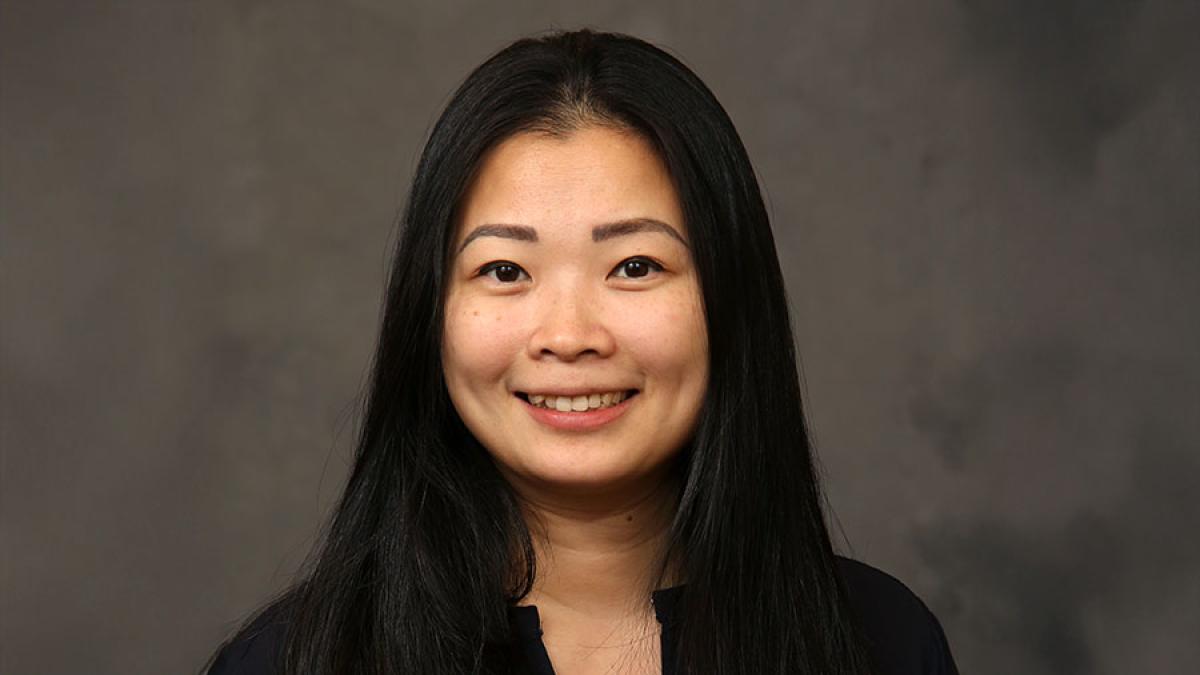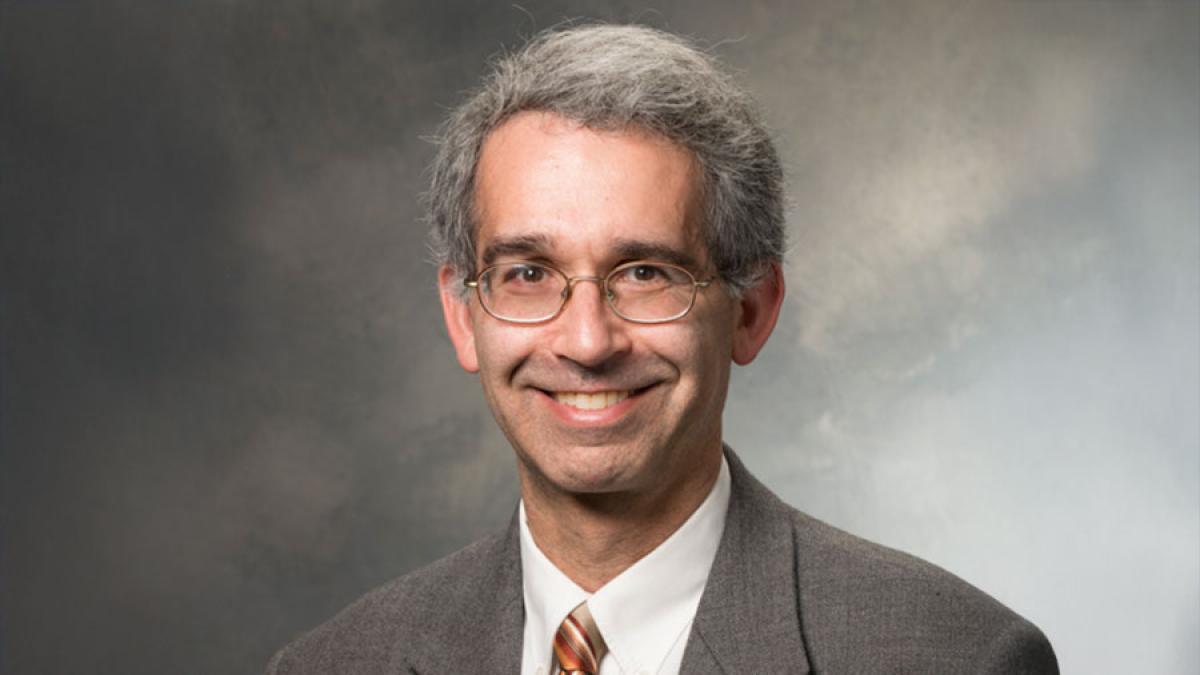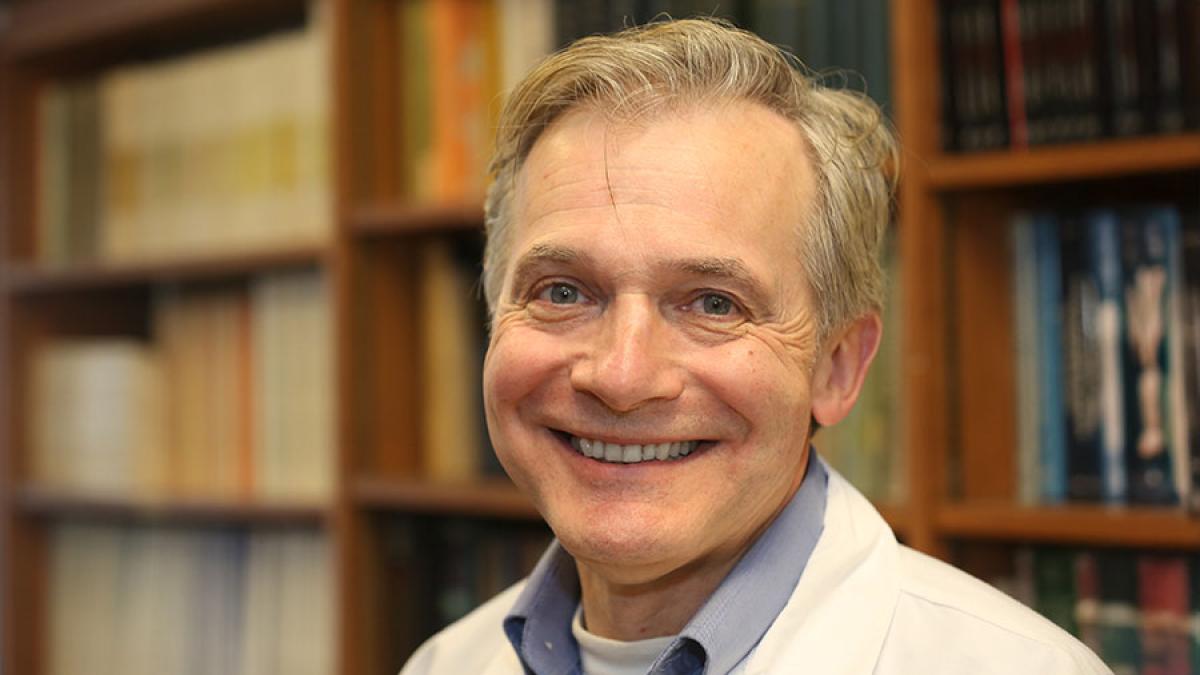Professor
Professor Chan’s research interest focuses on microbial interactions with their environments and other microbes through cell surface proteins.
Biochemistry and Molecular Biology, MS
Advance your scientific career with a graduate degree in biochemistry and molecular biology from Pace University. Conduct cutting-edge research of life sciences at the molecular level and prepare for leadership roles in biotech, medicine, pharmaceuticals, agriculture and beyond.
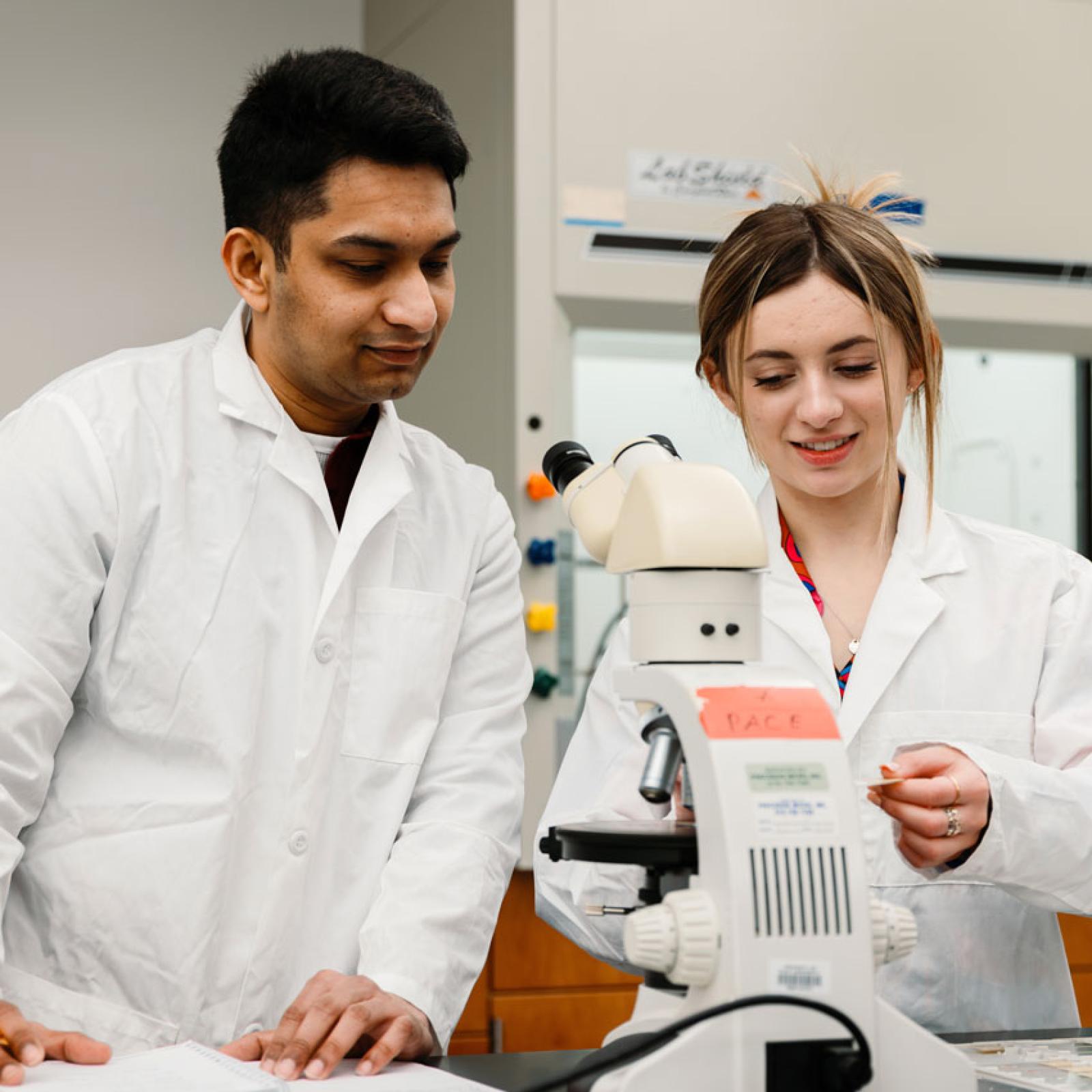
New York City
34 Credits
12–24 Months, full-time and part-time
In-Person
Fall, Spring
Yes
Yes
Conduct Breakthrough Research with a Master’s in Biochemistry and Molecular Biology
Pace University’s MS in Biochemistry and Molecular Biology, offered through the Dyson College of Arts and Sciences, combines a rigorous curriculum with hands-on research experience to prepare you for careers in science and industry. Our program provides advanced training in bioinformatics, genomics, and molecular techniques, with access to state-of-the-art laboratory spaces, including a DNA sequencing facility, pathogen-handling suite, HPLC-coupled mass spectrometry, and advanced spectrophotometric analysis.
Located on the New York City Campus, you’ll be connected to leading research institutions and have access to collaborative opportunities across the region. Pursue research in the Department of Neuronal Cell Signaling at Weill Cornell Medical School or engage in international projects with partners such as the University of Technology Sydney. You’ll work closely with expert faculty on research supported by organizations including the National Institutes of Health and the Gates Foundation.
Upon graduating, you’ll be well prepared for doctoral study or for advancing your career in biotechnology, pharmaceuticals, and academic research.
median annual wage for biochemists and biophysicists in the United States (Source: Bureau of Labor Statistics)
projected job growth through 2034 (Source: Bureau of Labor Statistics)
number of Jobs, 2024–2034 (Source: Bureau of Labor Statistics)
Curriculum for Biochemistry and Molecular Biology, MS
The 34-credit MS program in Biochemistry and Molecular Biology (MSBMB) offers students a professional development graduate degree with enhanced capability and competitiveness in career-related biochemistry, molecular biology, and health-related fields. This is a thesis-based graduate program that contains training in ethical and regulatory issues, a requirement of all new Federal grant applicants.
Take Courses Like…
- BMB 620 Quantitative Methods: Data Analysis and Presentation
Understand how to use statistics and probability to support scientific conclusions. - BMB 626 Cellular Biochemistry and Advanced Molecular Biology
Discover how molecular interactions control neuronal signaling and drug mechanisms. - BMB 630 Bioinformatics, Genomics, and Proteomics
Explore statistical and computational methods to model gene expression and evolutionary patterns.
Set Your Sights Abroad!
Set your sights abroad! Opportunity exists for taking all or part of the course at the University of Technology Sydney, Australia. Additionally, students graduating from the MS Molecular Biology and Biochemistry program have the opportunity to continue into the PhD program at UTS.
The molecular biology and biochemistry masters program offers the opportunity to pursue thesis research in the department of biology, chemistry, or Haskins Laboratories at Pace, in several departments at Albert Einstein College of Medicine, Weill Cornell Medical College, or internationally at the University of Technology in Sydney, Australia.
Biochemistry and Molecular Biology Careers
Pace’s MS in Biochemistry and Molecular Biology provides biochemistry and molecular biology students with an excellent preparation for professional employment, advanced graduate work, teaching, and a variety of private and public service positions.
As a Pace student, you’ll have the opportunity to connect with our robust career services team to develop a career plan that best fits your goals.
Our Graduates Are Prepared for Jobs Like:
- Medical Research Laboratories: All research and teaching laboratories are required to employ a graduate laboratory supervisor to oversee the facility.
- Government Agencies: The National Institutes of Health, US Food and Drug Administration, Environmental Protection Agency, US Department of Agriculture, and individual state laboratories employ skilled personnel for basic research and analysis of food, drugs, air, water, wastes, and animal tissue samples.
- Biotechnology: The field offers excellent career opportunities for people trained in the molecular life sciences, with opportunities across a spectrum of many industries.
- Non-Traditional Careers: Biochemists and molecular biologists enjoy fulfilling careers in management, science policy, science writing, and medical illustration.
Salary stats below sourced from Salary.com and Bureau of Labor Statistics.
- Research Scientist (Average Salary: $141,028)
- DNA Analyst (Average Salary: $118,516)
- Senior Scientific Writer (Average Salary: $115,878)
Student Quote
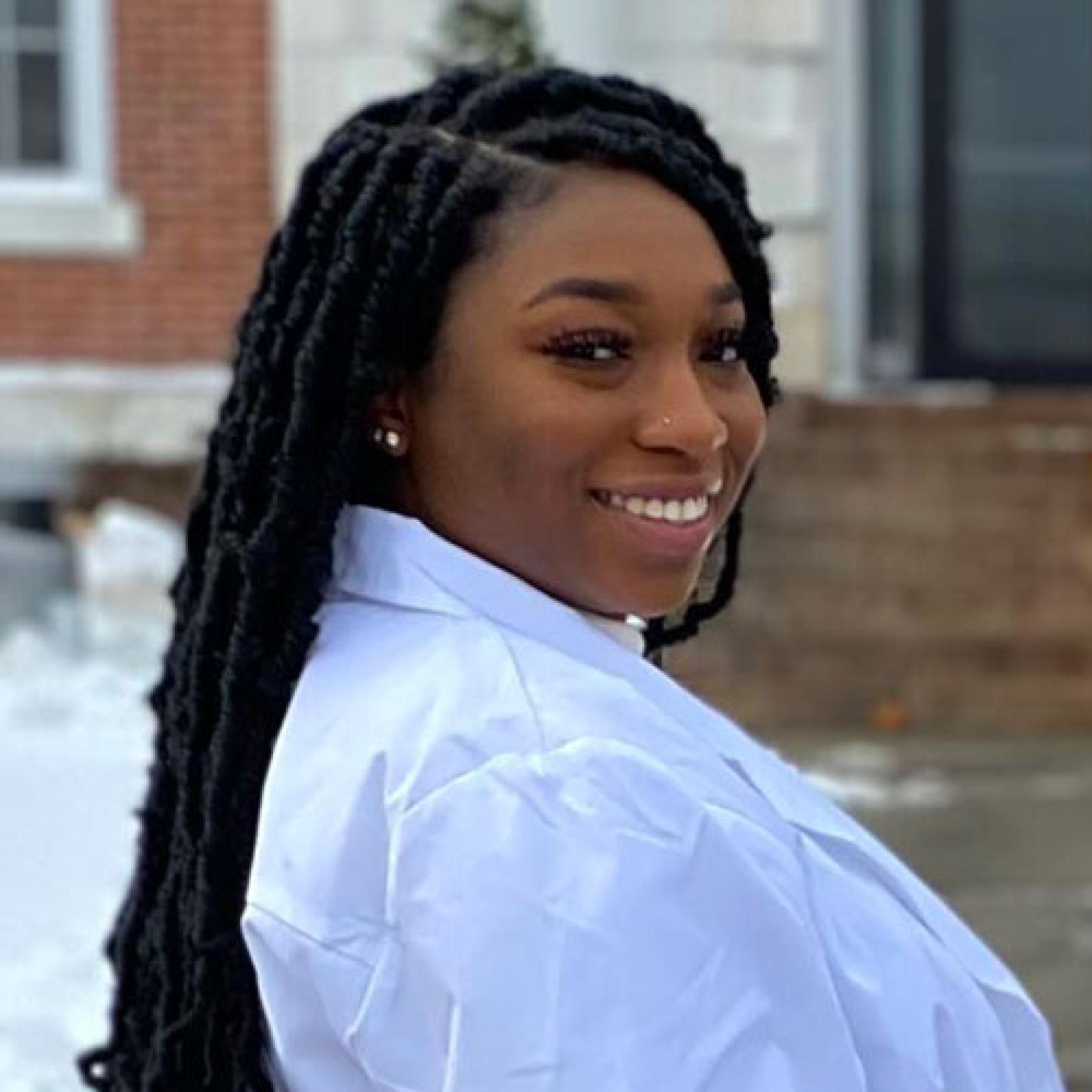
—Janine Smalling ‘23, MS Biochemistry and Molecular Biology
International Career Success Program
The INSPIRE Program (International Student Professional Readiness Program) is a badged internship and career success program exclusive to Pace. Year after year, this one-of-a-kind program empowers international students to achieve results in obtaining internships, jobs, and salary outcomes. Domestic students, we have an equivalent program for you called ASPIRE.
Where Pace Graduates are Employed
- Fisher-Scientific
- Admera Health
- Church and Dwight
- Simons Foundation
- Eli Lilly
- Pfizer
- Regeneron
- Memorial Sloan Kettering
- Weil-Cornell Medical School
- Icahn School of Medicine
- The Hospital of Special Surgery
Featured Faculty
Professor
Professor Strahs’s research interest includes understanding the biochemistry of DNA-processing enzymes.
Professor
Professor Yarlett’s research interests include biochemistry and molecular biology of parasitic protozoa, particularly Cryptosporidia sp., and Trypanosomes.
Admission and Financial Aid
You're ready for a new level of success—whether it's advancing in your current field or launching a new career. Pace is with you every step of the way, providing a world-class education and the skills your industry will be looking for far into the future.
-
- A personal statement explaining to the Graduate Admission Committee why you would like to pursue the program of graduate study you have chosen. Additional information regarding your academic performance, as well as professional experience, may also be included in the supplement.
- A resume or outline describing at least the past five years of your employment history and any significant community, professional, or college extracurricular activities.
- Applicants need 2 letters of recommendation. Letters should be from academic or professional references that can knowledgeably comment on your ability to successfully complete graduate study. Include recognitions and achievements (e.g. licenses, publications, and awards).
- All Official Transcripts: Transcripts from every accredited college or university attended (not just the degree granting institution) must be sent either to Pace University, directly from the academic institution electronically or by mail, or forwarded by the applicant in sealed envelopes from the academic institution.
-
Per credit: $1,540 | Total cost of program: $52,360
*Tuition based on current year and subject to change. -
Fall Term
- Domestic Students: August 1
- International Students: June 1
Spring Term
- Domestic Students: December 1
- International Students: October 1
-
Make an appointment to meet with you admission counselor.
-
Every admitted student is automatically considered for all available financial aid options, assessed based on both availability and individual need. Financial resources include:
- Merit-based Scholarships: Awards of up to $7,000, automatically considered during the application process.
- Graduate Assistantships: Opportunities for hands-on experience while earning financial support.
- Endowed Scholarships: Awards funded by generous donors to support student success.
- Federal Direct Unsubsidized Stafford Loan: A federal loan program with favorable terms.
- Graduate/Professional Direct PLUS Loan: For students who need additional funding.
- Work-Study Programs: Part-time work opportunities to help fund your education.
- Military Benefits: Includes the GI Bill®, the Yellow Ribbon Program, and Pace’s Veteran Tuition Scholarship.
For more information about affordability and the full range of financial aid options, visit Pace University Financial Aid.
GI Bill® is a registered trademark of the U.S. Department of Veterans Affairs (VA).
Contact Us
Admission Contact
Office of Graduate Admission
Phone: (212) 346-1531
Email: graduateadmission@pace.edu
Departmental Contact
Nigel Yarlett, PhD
Email: nyarlett@pace.edu
